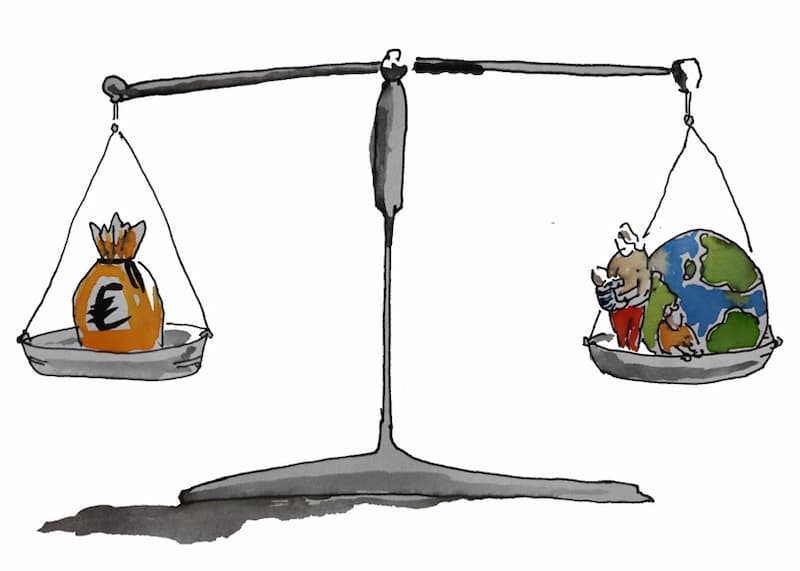
24 January, 2025
Promotional Pens In Your Corporate Social Responsibility Strategy
In today’s business landscape, corporate social responsibility (CSR) is not just a buzzword; it’s a crucial part of a company's ethos. Companies are increasingly being judged not just on their products and services, but on their impact on society and the environment. One subtle yet powerful way to exhibit CSR is through promotional merchandise, such as pens.
Why Has CSR Become So Important?
Firstly, let's try to understand what Corporate Social Responsibility (CSR) is all about. It has transitioned from a nice-to-have to a must-have. No longer an afterthought, it is now a critical component of a company's identity and strategy. But why has CSR become so important in the modern business era?
1. Increasing Consumer Awareness and Demand
Ethically Conscious Consumers: Today's consumers are more informed and concerned about the social and environmental impacts of their purchases. They seek out brands that align with their values and are willing to pay a premium for ethically produced goods.
Transparency Expectations: With information readily available at their fingertips, consumers expect transparency from companies. They want to know where products come from, how they are made, and the impact they have on society and the environment.
2. The Role of Social Media and Connectivity
Amplified Voices: Social media has given consumers and activists a platform to voice their opinions and concerns. A single tweet or post about a company's unethical practices can go viral, damaging the brand's reputation.
Global Connectivity: Social media also connects consumers globally, meaning that local issues can gain international attention quickly, amplifying the need for responsible business practices.
3. Attracting and Retaining Talent
Millennial and Gen Z Workforce: Younger generations entering the workforce place great importance on working for companies that are socially and environmentally responsible. CSR initiatives are thus crucial in attracting and retaining top talent.
Employee Engagement and Morale: Employees are more engaged and have higher morale when working for companies that they believe are making a positive impact.

4. Long-Term Business Sustainability
Risk Management: Engaging in CSR practices helps companies identify and manage risks, particularly environmental and social risks, which can have significant financial implications.
Investor Interest: Investors are increasingly factoring in a company’s CSR performance in their investment decisions. Sustainable investing is on the rise, with investors looking for companies that have robust CSR strategies.
5. Regulatory Pressure and Compliance
Government Policies: Governments around the world are increasingly introducing regulations that require businesses to be more responsible in their operations. Compliance with these regulations is not just about avoiding penalties but also about staying competitive.
International Standards: Global standards and frameworks for CSR, such as the United Nations Sustainable Development Goals (SDGs), are also influencing companies to align their strategies with these global objectives.
How Can Pens Be Part Of This?
There are many ways printed promotional pens can become part of your CSR. Below are some helpful tips
1. Eco-Friendly Materials: A Step Towards Sustainability
Bamboo and Recycled Materials
Resource Efficiency: Bamboo grows quickly and requires minimal resources, making it a highly sustainable material. Using recycled materials such as paper and plastic reduces waste and conserves resources.
Reduced Carbon Footprint: These materials typically have a lower carbon footprint compared to new plastic production, aligning with efforts to combat climate change.
Consumer Perception: Products made from these materials are often perceived more favourably by environmentally conscious consumers, enhancing brand reputation.

Biodegradable Options
End-of-Life Impact: Biodegradable promotional pens are designed to break down naturally after disposal, reducing landfill waste. This feature is particularly important as pens are often disposed of after use.
Material Innovations: They can be made from various organic materials like cornstarch or bioplastics, showcasing a brand’s commitment to innovative, sustainable solutions.
Education and Awareness: Offering these can also serve as a tool to educate consumers about sustainability and responsible disposal practices.
2. Supporting Ethical Manufacturing
Fair Labor Practices
Moral and Ethical Responsibility: Committing to fair labour practices demonstrates a brand's ethical standards. It ensures workers are treated fairly, which is increasingly important to global consumers.
Brand Trust and Loyalty: Brands that are transparent about their commitment to ethical labour are more likely to earn and retain consumer trust and loyalty.
International Standards Compliance: Aligning with international labour standards can also open up more global market opportunities and partnerships.
Transparency in Supply Chain
Building Consumer Confidence: A transparent supply chain reassures consumers and stakeholders the products they purchase are ethically made.
Risk Management: Understanding and disclosing supply chain practices helps in identifying and mitigating potential risks related to labour or environmental violations.
Continuous Improvement: Transparency can foster a culture of continuous improvement in ethical practices throughout the supply chain.
3. Community Engagement and Social Impact
Collaborations with Social Enterprises
Supporting Local Economies: Working with social enterprises or local artisans helps in supporting local economies and can promote traditional craftsmanship.
Unique Product Offerings: Collaborations can result in unique, handcrafted products that stand out in the market, appealing to consumers seeking originality and authenticity.
Storytelling and Brand Identity: Such partnerships often come with compelling stories about the people and communities behind the products, enriching brand narrative and identity.

Charitable Partnerships
Direct Social Impact: Partnering with charitable organisations can directly contribute to social causes, enhancing corporate philanthropy and community involvement.
Consumer Engagement: Many consumers prefer to purchase from brands that support social causes, and such partnerships can increase customer engagement and loyalty.
Holistic CSR Approach: Charitable partnerships can be part of a broader CSR strategy, demonstrating a company's commitment to social responsibility beyond its business operations.
4. Messaging and Branding
Educational and Awareness Campaigns
Effective Communication Tool: Pens can be effective tools for communicating messages about social and environmental issues. For instance, a pen printed with a message about ocean conservation can raise awareness every time it’s used.
Accompanying Educational Material: Including informational leaflets or QR codes linked to educational content with each pen can enhance the impact of the message, turning a simple promotional item into an educational resource.
Brand Values Alignment
Consistency in Messaging: The design and message on the pens should consistently reflect the company's CSR values. For example, a company focusing on reducing plastic waste should use ones made from recycled materials.
Brand Image Reinforcement: This alignment not only strengthens the brand's CSR commitment in the eyes of the public but also reinforces the company’s identity and mission internally and externally.
5. Long-term Commitment vs One-off Campaigns
Sustainable Branding
Consistency in CSR Efforts: Regular use of sustainable promotional items like pens demonstrates a long-term commitment to CSR, rather than a temporary marketing tactic. This consistent approach helps in building a strong and credible brand reputation.
Market Differentiation: Ongoing CSR efforts can differentiate a brand in a crowded market, appealing to consumers who prioritise sustainability and ethical practices in their purchasing decisions.
Employee Involvement
Internal Culture Building: Involving employees in the process, such as selecting eco-friendly pen designs or participating in related CSR activities, can foster a culture of responsibility and ethics within the organization.
Employee Engagement and Morale: Employees are more likely to feel proud and motivated working for a company that actively practices CSR, leading to increased engagement and job satisfaction.
6. Measuring Impact and Feedback
Assessing Environmental Impact
Environmental Footprint Analysis: Regularly evaluate the environmental impact of your promotional pens, including assessments of the lifecycle emissions and resource use.
Continuous Improvement: Use these assessments to continuously improve the sustainability of your products, striving for reduced environmental impact over time.
Customer and Stakeholder Feedback
Valuable Insights: Collecting feedback from customers and stakeholders about the company's CSR initiatives can provide valuable insights into public perception and areas for improvement.
Strategy Refinement: Feedback can help refine the strategies, ensuring they remain effective and aligned with both the company’s goals and public expectations.
Three Companies Embracing Effective CSR and the Impact on Their Success
Below are three companies that have effectively integrated CSR into their operations and seen not only an enhancement in their brand image but also a boost in their overall success.
1. Patagonia
Effective CSR Initiatives
Environmental Activism: Patagonia has long been a leader in environmental activism. The company has committed to "1% for the Planet," donating 1% of its total sales to environmental groups.
Sustainable Practices: They are known for using recycled materials in their products and have implemented initiatives to reduce their carbon footprint significantly.
Fair Trade Commitment: It ensures fair labour practices and has been a pioneer in the apparel industry for its commitment to fair trade.
Impact on Success
Brand Loyalty: Patagonia’s strong environmental stance has garnered immense brand loyalty, especially among consumers who prioritise environmental sustainability.
Market Differentiation: Their commitment to sustainability has distinguished them in a crowded market, positioning them as more than just an apparel company but as an activist for environmental causes.
Employee Engagement: The company’s CSR initiatives have also fostered a strong sense of pride and commitment among its employees, enhancing productivity and job satisfaction.
2. Microsoft
Effective CSR Initiatives
Philanthropy: Through its philanthropic arm, Microsoft Philanthropies, the company has made significant contributions to global health, education, and technology accessibility.
Sustainable Operations: Microsoft has committed to becoming carbon negative by 2030 and is investing in technologies to reduce carbon emissions.
Empowering Communities: The company runs numerous programs aimed at empowering communities through technology, education, and skills development.
Impact on Success
Corporate Image: Its CSR initiatives have greatly enhanced its corporate image, aligning it as a technology leader that cares about global societal issues.
Employee Attraction and Retention: Their CSR reputation has made it an attractive employer for top talent who wish to work for a company with a conscience.
Business Sustainability: Its commitment to sustainability and ethical practices has also positioned the company as forward-thinking, aligning with investor and consumer expectations for ethical business practices.

3. Starbucks
Effective CSR Initiatives
Ethical Sourcing: Starbucks has made a commitment to ethical sourcing of its products, ensuring fair trade practices and sustainable farming.
Community Engagement: The company has initiatives focused on community service and engagement, with employees encouraged to volunteer in local community projects.
Environmental Footprint: It is committed to reducing its environmental impact through recycling, reducing waste, and using renewable energy sources.
Impact on Success
Consumer Trust: Starbucks’ commitment to ethical practices and community engagement has built a high level of consumer trust and loyalty.
Brand Reputation: Their efforts in sustainability and ethical sourcing have bolstered the brand’s reputation as a responsible corporate citizen.
Market Leadership: These initiatives have helped it maintain its position as a leader in the coffee industry, not just in sales but also in corporate responsibility.
Companies like Patagonia, Microsoft, and Starbucks show how effectively integrated CSR strategies can lead to enhanced brand loyalty, a stronger corporate image, and overall business success. Their commitment to environmental sustainability, community engagement, and ethical practices serves as a model for how CSR can be a key driver of success in the modern business world.
Conclusion: Pens as Tools of Change
In conclusion, promotional pens, a seemingly small aspect of a company’s marketing strategy, can play a significant role in demonstrating corporate social responsibility. By choosing eco-friendly materials, supporting ethical manufacturing, engaging in community projects, and using them to convey a powerful message, companies can make a tangible impact. Incorporating promotional pens into your CSR strategy is not just about giving away a product; it’s about making a statement of your brand’s values and commitment to a better world.
The Printed Pens Team

